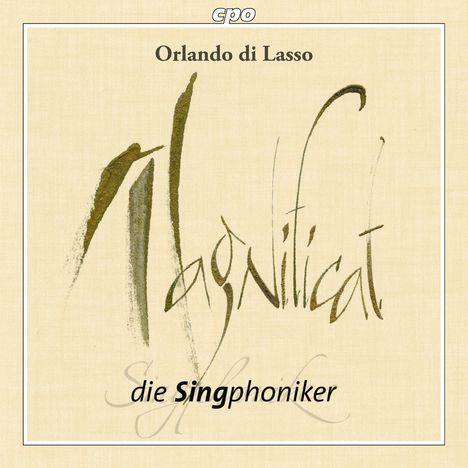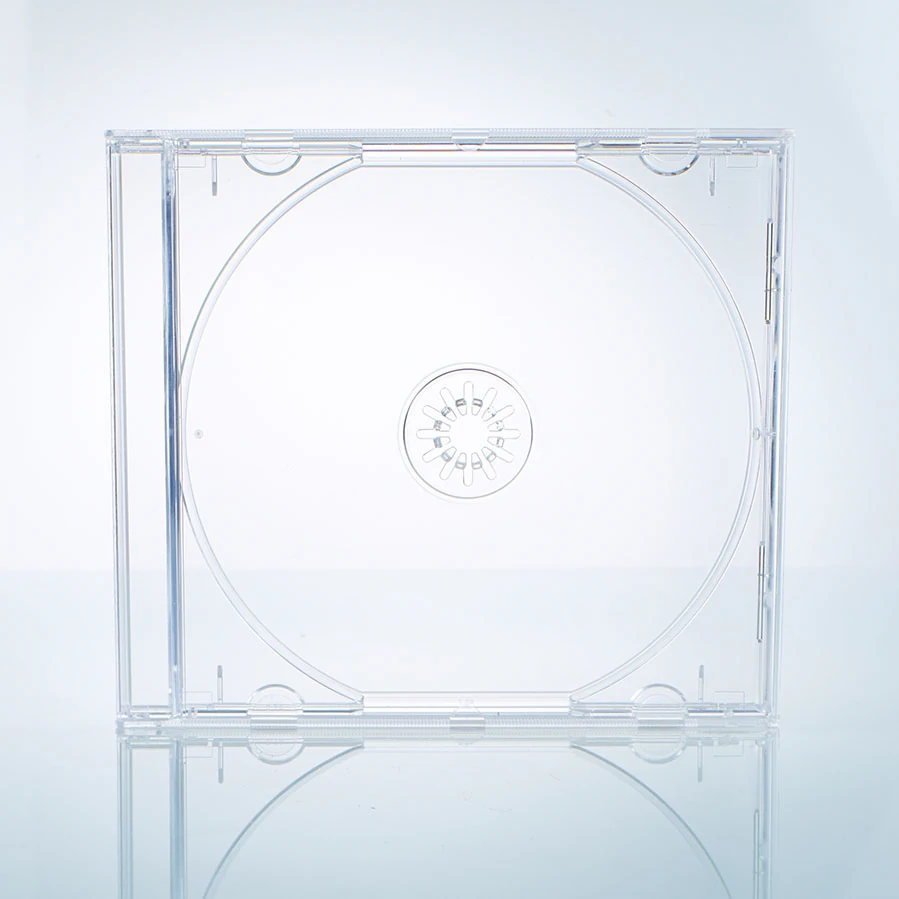Orlando di Lasso (Lassus): Magnificat sexti toni auf CD
Magnificat sexti toni
Herkömmliche CD, die mit allen CD-Playern und Computerlaufwerken, aber auch mit den meisten SACD- oder Multiplayern abspielbar ist.
Lassen Sie sich über unseren eCourier benachrichtigen, falls das Produkt bestellt werden kann.
+Cipriano de Rore: Da le belle contrade
+Giachet de Berchem: O s'io potessi donna
+Josquin Desprez: Praeter rerum seriem
+Claude de Sermisy: Il est jour
+Anselmo de Reulx: S'io credessi per morte essere scarco
+Philippe Verdelot: Ultimi miei sospiri
- Künstler:
- Die Singphoniker
- Label:
- CPO
- Aufnahmejahr ca.:
- 2014
- UPC/EAN:
- 0761203795727
- Erscheinungstermin:
- 15.10.2015
Ähnliche Artikel
Die Singphoniker & Orlando di Lasso II
Nach der erfolgreichen CD mit Hymnen von Orlando di Lasso, gibt es jetzt die neue CD mit den Singphonikern mit dem Titel „Magnificat“. Die mehrstimmigen Abschnitte der ausgewählten Magnificat-Kompositionen basieren hier aber nicht auf den einstimmigen Modellen, sondern auf präexistenten Kompositionen. Wir haben es also mit Parodie-Werken zu tun. Ein bei Messen verbreitetes Verfahren wird damit auf das Magnificat übertragen, 40 der 101 Magnificatkompositionen Lassos sind diesem Typus zuzurechnen. Bei den Imitationsmagnificat handelt es sich keineswegs um eine simple Neutextierung von präexistenten Werken. Lasso greift zu Beginn meist ziemlich exakt sein Modell auf, rasch weicht er aber davon ab. Im Magnificat über Rores Madrigal Da le belle contrade entspricht der Anfang der Vorlage, aber schon bald löst er sich davon, die Textpassage „in Deo salutari“ ist völlig frei komponiert. Die Vorgehensweise hat also etwas von einem Collage-Verfahren: Die Möglichkeiten reichen von der Übernahme ganzer Passagen bis hin zu Umschichtungen von Blöcken, Paraphrasierung, Zitaten einzelner Stimmen, freier Fortführung etc. Was vorliegt, kann getrost als Neuschöpfung auf der Basis eines präexistenten Werks bezeichnet werden. " Den Klang, den die Singphoniker entfalten, könnte man als gleichermaßen kathedralartik und direkt eindringlich beschreiben. Es ist immer wieder erstaunlich, zu welcher Klangfülle ein sechsköpfiges Vokalensemble fähig ist.“ (FonoForum 02 / 13)
Product Information
The Singphoniker & Orlando di Lasso II
After our successful CD featuring hymns by Orlando di Lasso, we are now releasing a new CD with the Singphoniker entitled Magnificat. Here, however, the polyphonic segments of the selected Magnificat compositions are based not on monophonic models but on preexistent compositions. Accordingly, here we have to do with parody works in which a procedure widespread in Masses is applied to the Magnificat. Forty of Lasso’s 101 Magnificat compositions are to be assigned to this type. These imitation Magnificats in no way involve a simple retextualization of preexistent works. At the beginning Lasso mostly rather precisely draws on his particular model, but then he quickly departs from it. In the Magnificat on Rore’s Da le belle contrade the beginning corresponds to the original, but soon thereafter it departs from it; the textual passage »in Deo salutari« is completely freely set. This procedure thus is somewhat similar to collage technique: the possibilities range from the use of whole passages to the relayering of blocks, paraphrasing, quotations of individual voices, free continuation, and so on. The result may safely be termed a new creation on the basis of a preexistent work. »The sound developed by the Singphoniker may be described as cathedral and no less directly immediate. The great fullness of sound displayed by this six-man vocal ensemble never fails to amaze the listener« (FonoForum 2 / 13).
Rezensionen
klassik.com 12/2015: »Dieses Prinzip, Qualitätvolles weiterzutragen, lebendig zu halten und als Reverenz an große Zeitgenossen oder Vorläufer zu präsentieren, ist schon eine beeindruckend uneitle Praxis. Freilich darf man nicht vergessen, dass die Lassos Beschäftigung mit diesen Kompositionen zugleich die musikalischen Vorbilder ehrte nd deren Kunst neuerlich in den Mittelpunkt rückte. Das Klangbild wirkt sehr natürlich, ist von edler Größe, ausgewogen in der Präsenz der Stimmen, mit viel natürlichem Charme. Im Booklet informieren mehrere Texte sehr informativ zum musikalischen Hintergrund ebenso wie zum spirituellen und theologischen Behalt des Magnificat.«Tracklisting
Disk 1 von 1 (CD)
-
1 Cipriano de Rore: Da le belle contrade
-
2 Orlando di Lasso: Magnificat sexti toni Dalle belle contrade
-
3 Jacquet de Berchem: O s'io potessi donna
-
4 Orlando di Lasso: Magnificat secundi toni O s'io potessi
-
5 Josquin Desprez: Praeter rerum seriem
-
6 Orlando di Lasso: Magnificat secundi toni Praeter rerum seriem
-
7 Claudio de Sermisy: Il est jour dit l'alouette
-
8 Orlando di Lasso: Magnificat secundi toni Il est jour
-
9 Anselmo de Reulx: S'io credessi per morte essere scarco
-
10 Orlando di Lasso: Magnificat tertii toni S'io credessi per morte
-
11 Philippe Verdelot: Ultimi miei sospiri
-
12 Orlando di Lasso: Magnificat secundi toni Ultimi miei sospiri
Mehr von Orlando di Lass...
-
Orlando di Lasso (Lassus)Prophetiae Sibyllarum (22 Weihnachtsmotetten)CDAktueller Preis: EUR 7,99
-
Orlando di Lasso (Lassus)Bußpsalmen I-VIII2 CDsVorheriger Preis EUR 19,99, reduziert um 0%Aktueller Preis: EUR 9,99
-
Orlando di Lasso (Lassus)Lagrime di San PietroCDVorheriger Preis EUR 19,99, reduziert um 0%Aktueller Preis: EUR 3,99
-
Orlando di Lasso (Lassus)Patrocinium musices 1573/74CDAktueller Preis: EUR 6,99

















